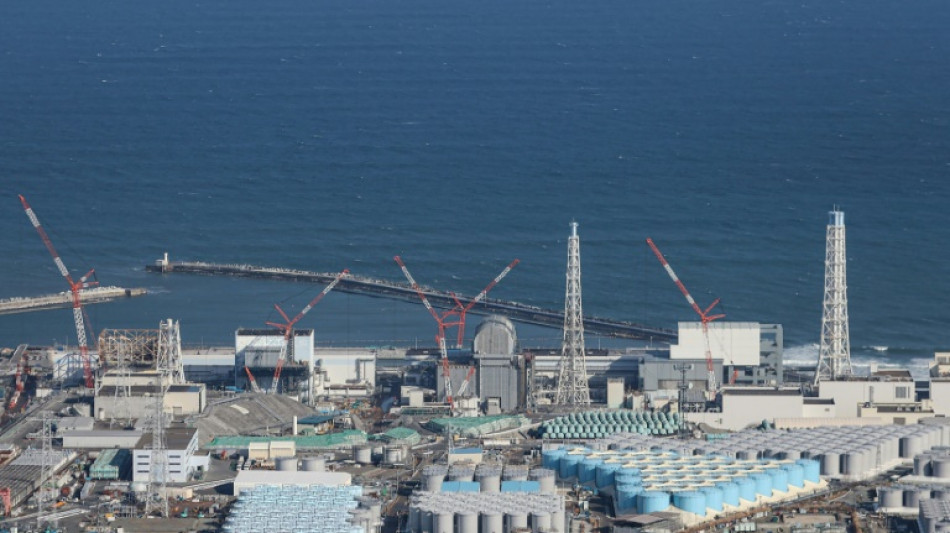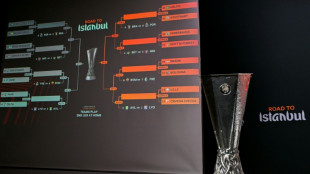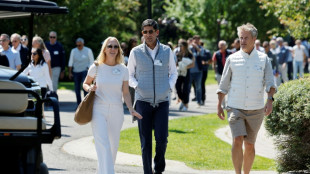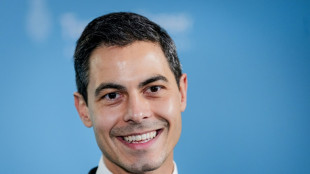
-
 Dutch PM-elect Jetten says not yet time to talk to Putin
Dutch PM-elect Jetten says not yet time to talk to Putin
-
Social media fuels surge in UK men seeking testosterone jabs

-
 Forest face Fenerbahce, Celtic draw Stuttgart in Europa League play-offs
Forest face Fenerbahce, Celtic draw Stuttgart in Europa League play-offs
-
US speed queen Vonn crashes at Crans-Montana, one week before Olympics

-
 Trump nominates former US Fed official as next central bank chief
Trump nominates former US Fed official as next central bank chief
-
New Dutch government pledges ongoing Ukraine support

-
 Newcastle still coping with fallout from Isak exit, says Howe
Newcastle still coping with fallout from Isak exit, says Howe
-
Chad, France eye economic cooperation as they reset strained ties

-
 Real Madrid to play Benfica, PSG face Monaco in Champions League play-offs
Real Madrid to play Benfica, PSG face Monaco in Champions League play-offs
-
Everton winger Grealish set to miss rest of season in World Cup blow

-
 Trump brands Minneapolis nurse killed by federal agents an 'agitator'
Trump brands Minneapolis nurse killed by federal agents an 'agitator'
-
Arteta focuses on the positives despite Arsenal stumble

-
 Fijian Drua sign France international back Vakatawa
Fijian Drua sign France international back Vakatawa
-
Kevin Warsh, a former Fed 'hawk' now in tune with Trump

-
 Zverev rails at Alcaraz timeout in 'one of the best battles ever'
Zverev rails at Alcaraz timeout in 'one of the best battles ever'
-
Turkey leads Iran diplomatic push as Trump softens strike threat

-
 Zelensky backs energy ceasefire, Russia bombs Ukraine despite Trump intervention
Zelensky backs energy ceasefire, Russia bombs Ukraine despite Trump intervention
-
'Superman' Li Ka-shing, Hong Kong billionaire behind Panama ports deal

-
 Skiing great Lindsey Vonn crashes at Crans-Montana, one week before Olympics
Skiing great Lindsey Vonn crashes at Crans-Montana, one week before Olympics
-
Slot warns Liverpool 'can't afford mistakes' in top-four scrap

-
 Paris show by late Martin Parr views his photos through political lens
Paris show by late Martin Parr views his photos through political lens
-
Artist chains up thrashing robot dog to expose AI fears

-
 Alcaraz outlasts Zverev in epic to reach maiden Australian Open final
Alcaraz outlasts Zverev in epic to reach maiden Australian Open final
-
French PM forces final budget through parliament

-
 French-Nigerian artists team up to craft future hits
French-Nigerian artists team up to craft future hits
-
Dutch watchdog launches Roblox probe over 'risks to children'

-
 Trump brands Minneapolis nurse shot dead by federal agents an 'agitator'
Trump brands Minneapolis nurse shot dead by federal agents an 'agitator'
-
Israel says killed 'three terrorists' in Gaza

-
 After Trump-fueled brawls, Canada-US renew Olympic hockey rivalry
After Trump-fueled brawls, Canada-US renew Olympic hockey rivalry
-
Eileen Gu - Olympic champion who bestrides rivals US, China

-
 Trump, first lady attend premier of multimillion-dollar 'Melania' documentary
Trump, first lady attend premier of multimillion-dollar 'Melania' documentary
-
US Senate eyes funding deal vote as government shutdown looms

-
 Cuddly Olympics mascot facing life or death struggle in the wild
Cuddly Olympics mascot facing life or death struggle in the wild
-
UK schoolgirl game character Amelia co-opted by far-right

-
 Anger as bid to ramp up Malaysia's football fortunes backfires
Anger as bid to ramp up Malaysia's football fortunes backfires
-
Panama court annuls Hong Kong firm's canal port concession

-
 Pioneer African Olympic skier returns to Sarajevo slopes for documentary
Pioneer African Olympic skier returns to Sarajevo slopes for documentary
-
Trump threatens tariffs on nations selling oil to Cuba

-
 From fragile youngster to dominant star, Sabalenka chases more glory
From fragile youngster to dominant star, Sabalenka chases more glory
-
Lowly Montauban 'not dead' in French Top 14 survival hunt

-
 'Winter signing' Musiala returns to boost weary Bayern
'Winter signing' Musiala returns to boost weary Bayern
-
Elena Rybakina: Kazakhstan's ice-cool Moscow-born Melbourne finalist

-
 Power battle as Sabalenka clashes with Rybakina for Melbourne title
Power battle as Sabalenka clashes with Rybakina for Melbourne title
-
Contrasting fortunes add Basque derby edge for Matarazzo's revived Sociedad

-
 Asian stocks hit by fresh tech fears as gold retreats from peak
Asian stocks hit by fresh tech fears as gold retreats from peak
-
Kim vows to 'transform' North Korea with building drive

-
 Peers and Gadecki retain Australian Open mixed-doubles crown
Peers and Gadecki retain Australian Open mixed-doubles crown
-
Britain's Starmer seeks to bolster China ties despite Trump warning

-
 Kaori Sakamoto - Japan skating's big sister eyes Olympic gold at last
Kaori Sakamoto - Japan skating's big sister eyes Olympic gold at last
-
Heavy metal: soaring gold price a crushing weight in Vietnam


Japan to start releasing Fukushima water on Thursday
Japan will begin releasing cooling water from the stricken Fukushima power plant on Thursday, 12 years after one of the world's worst nuclear disasters.
The announcement came despite opposition from fishermen and protests by China, which has already banned food shipments from several Japanese prefectures.
Japan insists the gradual release into the sea of the more than 500 Olympic swimming pools' worth of water that has accumulated at the stricken nuclear plant is safe, a view backed by the UN atomic agency.
Prime Minister Fumio Kishida announced the start date on Tuesday, a day after talks with fishing industry representatives who are opposed, "if weather and sea conditions do not hinder it".
The Fukushima-Daiichi nuclear plant was knocked out by a massive earthquake and tsunami that killed around 18,000 people in March 2011, with three of its reactors sent into meltdown.
Since then, operator TEPCO has collected 1.34 million tonnes of water used to cool what remains of the still highly radioactive reactors, mixed with groundwater and rain that has seeped in.
TEPCO says the water has been diluted and filtered to remove all radioactive substances except tritium, levels of which are far below dangerous levels.
"Tritium has been released (by nuclear power plants) for decades with no evidential detrimental environmental or health effects," Tony Hooker, a nuclear expert from the University of Adelaide, told AFP.
- 'Immense' -
This water will now be released into the ocean off Japan's northeast coast at a maximum rate of 500,000 litres (132,000 US gallons) per day.
Environmental pressure group Greenpeace has said the filtration process is flawed and that an "immense" quantity of radioactive material will be dispersed into the sea over the coming decades.
Japan "has opted for a false solution -- decades of deliberate radioactive pollution of the marine environment -- during a time when the world's oceans are already facing immense stress and pressures," Greenpeace said Tuesday.
The UN atomic watchdog said in July that the release would have a "negligible radiological impact on people and the environment".
- Salt panic -
Many South Koreans are alarmed at the prospect of the release, staging demonstrations and even stocking up on sea salt because of fears of contamination.
But President Yoon Suk Yeol's government, taking political risks at home, has sought to improve long-frosty relations with Japan and has not objected to the plan.
Yoon last week held a first-ever trilateral summit with Kishida and US President Joe Biden at Camp David, the three united by worries about China and North Korea.
China has accused Japan of treating the ocean like a "sewer", banning imports of food from 10 Japanese prefectures even before the release and imposing strict radiation checks.
Hong Kong, an important market for Japanese seafood exports, has also threatened restrictions.
This has worried people involved in Japan's fishing industry, just as business was beginning to recover more than a decade after the nuclear disaster.
"Nothing about the water release is beneficial to us," third-generation fisherman Haruo Ono, 71, whose brother was killed in 2011, told AFP in Shinchimachi, 60 kilometres (40 miles) north of the nuclear plant.
James Brady from the Teneo risk consultancy said that while China's safety concerns may be sincere, there was a distinct whiff of geopolitics and economic rivalry in its harsh reaction.
"The multifaceted nature of the Fukushima wastewater release issue makes it quite a useful one for Beijing to potentially exploit," Brady told AFP.
Beijing can "leverage a degree of economic pressure on the trade axis, exacerbate internal domestic political cleavages on the issue within Japan... and even potentially put pressure on improving diplomatic ties between Seoul and Tokyo".
Naoya Sekiya from the University of Tokyo last year conducted a survey which found that 90 percent of people China and South Korea thought Fukushima food was "very dangerous" or "somewhat dangerous".
"I think that's because Japan hasn't properly dispelled such concerns," Sekiya told AFP.
"(We) have to make a proper and sufficient explanation.”
J.Bergmann--BTB



